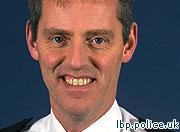Police officers in Scotland should treat crimes against homosexuals and minority groups more seriously than general crimes against the public, according to controversial new ‘hate crime’ guidance.
The police are looking to increase the reporting of so-called ‘hate crimes’ by promising minority groups that they will see a swifter and more robust response to offenders.
But this startling pledge is likely to increase concern about double standards among the police, and it could prove deeply offensive to many victims of crime.
Guidance
Assistant Chief Constable Mike McCormick, of Lothian and Borders Police, defended the guidance, saying: “We wanted to make sure our own staff were aware of the impact hate crime has.
“If you punch me in the nose because you don’t like me because of the colour of my skin, race, sexuality or whatever, that has a longer effect because I’m thinking that not only does this person not like me, but lots of other people won’t like me either.”
The Hate Crime Guidance Manual is being launched by the Association of Chief Police Officers in Scotland.
Tougher
It follows legislation introduced in Scotland earlier this year which stipulated that people who commit ‘hate crimes’ against homosexuals, transsexuals and the disabled will face tougher penalties.
Sergeant Martin White, one of the officers behind the manual, said: “[Under the act] if someone is arrested for hate crime, we must look to put them before the courts as soon as possible, if not from custody then bailed to appear as soon as possible.
“In the courts, hate crime has to be recorded and reflected in the sentence. It gives the courts the chance to give an appropriate sentence.”
Warned
Last week one of Britain’s top police officers warned that the police were chasing politically imposed targets instead of dealing with real crime, leaving yobs to run amok.
Sir Denis O’Connor, Chief Inspector of Constabulary, warned that bureaucratic targets imposed by central Government had skewed policing priorities.
And earlier this year a report by the Civitas think-tank cautioned that Christians in Britain were being unfairly targeted for hate crime prosecutions.
Freedom
The report, entitled A New Inquisition: Religious Persecution in Britain Today, also warned that existing hate crime legislation poses a danger to freedom of speech.
The report cited the example of Ben and Sharon Vogelenzang who were prosecuted for a hate crime, under Section 5 of the Public Order Act, last year after they engaged in a breakfast debate about Islam with a guest at their hotel.
The couple, who were supported by The Christian Institute, were declared innocent last December but the ordeal has caused the couple serious financial hardship.
By contrast the report also cited the example of a Muslim man who escaped prosecution for a hate crime despite defacing a war memorial with slogans such as “Islam will dominate the world – Osama is on his way”.

